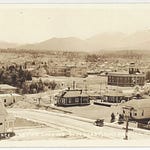While Clallam County leaders talk about housing affordability, they’ve stayed silent as millions in taxable land quietly disappear from the rolls—shifting the burden onto struggling homeowners. The Jamestown Tribe’s latest trust land request could cost taxpayers again, but commissioners refuse to even answer the federal government’s questions. Why are we paying more while they say nothing?
This month, Clallam County Commissioners received a notice from the Bureau of Indian Affairs (BIA): the Jamestown S'Klallam Tribe is requesting that two parcels of land be placed into federal trust.
One of the properties—purchased for $410,000 less than a year ago—is currently assessed by the County at just $218,530. If the transfer is approved, that land will come off the property tax rolls, costing Clallam taxpayers $1,477.66 annually.
This might seem like a minor hit, but these trust conversions are adding up—and equity is at the heart of the issue. Each time land is removed from the tax base, the cost of public services is redistributed across fewer residents. That shift falls hardest on seniors, renters, working families, and homeowners just barely making ends meet.
While our elected officials speak frequently about housing affordability and social equity, their silence on this very real tax shift says otherwise.
Rising costs, shrinking base
The timing couldn’t be more telling. Property taxes across Clallam County are surging. Many residents are now paying double what they once did for Olympic Medical Center. The Sequim School District is adding new levy and bond collections starting next year. Fire District 3 is requesting its own tax increase. And now the Clallam County general fund is seeking a 38% jump.
Note: the 38% increase applies only to the amount collected for the general fund, not an overall property tax hike.
These are cumulative costs—stacked onto one another—and they make it harder for ordinary residents to afford the very thing our officials say they care about: housing stability.
Yet with all this happening, our County Commissioners have never once submitted a response to the BIA when asked about the impacts of trust land conversions on our tax base.
That’s not just a missed opportunity—it’s a quiet betrayal of the equity they claim to champion.
What our leaders say—and don’t say
Commissioner Randy Johnson has frequently emphasized housing as the linchpin of economic and social stability. He helped launch the Housing Solutions Committee and has said publicly, “Housing is an issue related to everything we’re looking at.”
Commissioner Mike French speaks often about food insecurity, housing access, and economic justice. He serves on multiple advisory boards and supports initiatives like the federal Recompete Plan to reduce rural poverty.
Commissioner Mark Ozias has led the charge on equity-oriented hiring and ARPA-funded housing projects. He’s called out public school inequities and championed policies rooted in fairness and equal access.
But when it comes to these trust conversions—which directly shift the cost of public services onto those with the least ability to pay—they go quiet.
Silence = Consent
Every BIA notification invites local governments to submit data:
Yet for at least ten years, Clallam County has not responded to a single one.
Without a reply, the BIA assumes the county supports the conversion. No questions asked. No data provided. No equity analysis submitted.
This is more than procedural neglect—it’s a systemic blind spot. The people most burdened by rising property taxes aren’t wealthy landowners. They’re everyday Clallam residents—especially seniors, veterans, and renters—who are footing the bill while large landholders are excused from it.
The human cost of inaction
There are senior citizens in Clallam County paying their property taxes on credit cards. There are families making hard choices between groceries and their mortgage. Property taxes fund services for everyone—libraries, veterans relief, hospitals, and public schools.
The county’s failure to even acknowledge this shift is deeply inequitable. It benefits those with power and wealth at the expense of those without.
It’s also fundamentally undemocratic. The public is being asked to pay more, while our representatives won’t even send a letter saying why.
Real equity means playing by the same rules
A subcommittee of the Charter Review Commission—led by Commissioner Ron Richards—is currently working on a proposal to require county officials to respond to BIA requests for information. Not to oppose tribal land conversion. Not to undermine tribal sovereignty. Simply to provide honest data.
Opponents of the amendment have claimed that such a policy is racist or an attack on tribal heritage. That’s a dangerous distortion. This isn’t about heritage—it’s about equal accountability. The Jamestown S’Klallam Tribe is the second-largest employer in the county and earns millions in commercial revenue. Like any powerful entity, it should be subject to fair scrutiny when it comes to local public funding.
When large entities, whether corporations or governments, benefit from county roads, courts, and services, they should help pay for them. If they are exempt, then that shortfall lands squarely on the shoulders of those least able to absorb it.
That’s not equity. That’s exploitation dressed up as policy.
Where’s the equity in that?
Clallam County's leaders frequently invoke equity, inclusion, and affordability. But equity isn't just about good intentions. It’s about who pays, who benefits, and who is left out.
The next time the county considers a tax increase, voters should ask:
Why are we paying more while our commissioners refuse to even advocate on our behalf?
Fairness demands that we stop making excuses for silence—and start demanding action rooted in transparency, truth, and yes—real equity for all.
Last Equitable Wednesday, readers were asked how we should define “equity” in local policy decisions. Of 151 votes:
83% said, “Equity for all”
3% said, “Extra support for marginalized”
12% said, “Prioritize struggling areas”
3% said, “Not sure, it depends”













